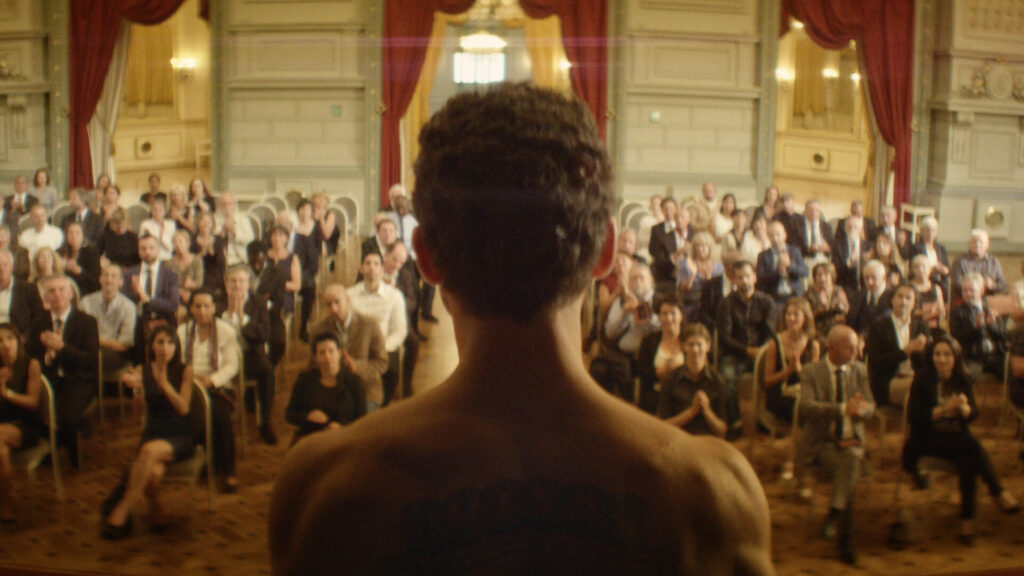The title – The Man Who Sold His Skin – is a plot summation that deftly hides the complexity behind its own premise. A Syrian refugee, Sam (Yahya Mahayni), unable to join his girlfriend Abeer (Dea Liane) in Europe therefore agrees to have his back tattooed for a Schengen visa by the infamous Belgian-American artist Jeffrey Godefroi (Koen De Bouw) in order to be sold as a piece of art and travel with the freedom of a commodity. But in this Faustian pact, what becomes of the man attached to the piece of himself which is traded freely? The film turns a painfully satirical eye to Western imperialist capitalism, and could easily take a place as a middle-eastern answer to recent successful cinema-critiques of our economic system, like Bong Joon-ho’s Parasite and Boots Riley’s Sorry To Bother You.

Throughout, philosophical-political statements are stated eerily straightforwardly, almost word-for-word the way some ideologue or another might phrase their analysis of the film. To paraphrase an example, the artist states in an interview that “people from the global south are persona non grata, they cannot travel, but I have turned Sam into a commodity, and commodities move more freely than people”. Simple enough. But every cut-and-dry interpretation coming from our protagonists, political activists, and art snobs, is subtly problematised by the acting, cinematography, or soundtrack.
The Man Who Sold His Skin is steeped in Western music, literature, and myth, prompting consideration of the bedevilled concept of immigrant assimilation. We have a Pygmalion and a Mephistopheles referred to in dialogue, and the latter particularly highlights the film’s interest in the transfiguration wrought upon individuals, societies and the environment by global capitalism.
Given its dark premise, it’s funnier than expected and sometimes humorously on the nose. There are a few scenes which are standout pieces of satire: beautifully aestheticized but with rich buffoons, insufferable westerners and callous insurance lawyers giving preposterously believable statements, as well as stretches of genuine absurdism – including a medical procedure which won’t be spoiled here but will have audiences cringe-laughing. Others, such as a particularly scathing commentary on the high-art world that unfolds at a collectors’ auction, would function independently as an award-winning short film.

The cinematography is beautiful throughout and, not to beat a dead horse, but every image is framed like a Renaissance painting. It’s a cliché, but wholly appropriate given that the film concerns itself with art, aestheticisation and commodification – it provokes the viewer by making a story of human maltreatment so visually stunning.
The film features great acting performances, particularly those of our Faustus and Mephistopheles: Sam and the artist. As Sam Ali, Mahayni portrays a range of emotional reactions to his character’s situation with intensely believable humanity. De Bouw is fantastic as Jeffrey Godefroi, lending an enigmatic, shifting mask to the artist’s nihilism. In an impressive tightrope-walking act, he has the audience guessing where his moral allegiance lies right until the very end.
Unfortunately and despite the talent attached, the female characters are underutilised in what proves a very male-centric film. Nonetheless, Liane presents Sam’s girlfriend Abeer as conflicted and emotionally torn by her circumstances while Monica Bellucci, as Godefroi’s assistant Soraya Waldy, is a source of much of the ambiguity surrounding the artist’s morals, given her relationship with our protagonist.
Another issue concerns the film’s pacing and use of time-jumps, which do seem a little slapdash vis-à-vis the slick expectations of arthouse; one of the most jarring culprits are the black ‘x months later’ title cards. The ending ties up all loose ends, but very quickly – though it is a little kitsch, it’s satisfying and feels earned given the film’s impressive satirical chops.
The Man Who Sold His Skin releases in cinemas September 24th.
